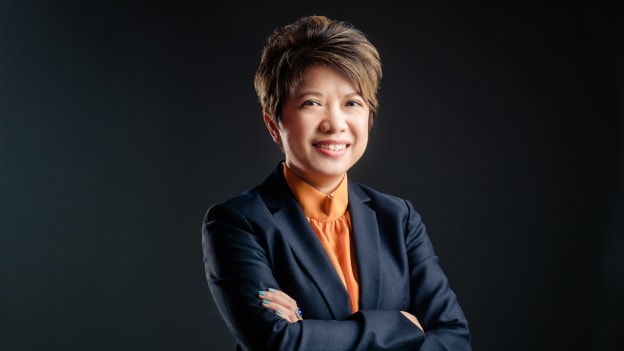The HR leadership journey: tenacity, flexibility, values

Being able to show role models and mentors is a key pathway to increasing diversity at any level. But what does it take for someone to work their way up to a life and career stage where they can be such a role model and mentor? People Matters asked long-time HR leader Carmen Wee, the author of From the Kampung to the Boardroom: My Leadership Journey, to tell us about her rise through the profession. Carmen has been in HR from the very start of her career, holding regional and then international roles with large companies, and within the last few years she stepped up to take board directorships.
Here's her career story: a journey of cross-disciplinary experience, flexibility, and openness to opportunity.
What you study isn't necessarily where you'll find your career
“When I was young, I thought that I wanted to become a social worker. I wanted to do something altruistic. So I studied social work at the National University of Singapore. In my final year, I was attached as a medical social worker for 10 weeks. It was very interesting, because the doctors would refer patients with emotional and counselling needs to the medical social work department, and I did my share of counselling, casework, and intervention. And I realised that I had no desire to do this work for the rest of my life. I could see how the other social workers were tired and burned out, how their caseload just piled up, and how they would be there for the next 10-20 years or until they retired – and I didn't see any future in that for myself."
“In that same year I had to take some elective programmes before graduating, and I stumbled upon a human resource management course. When I attended the classes, I found it really interesting, and I thought that even if social work wasn't for me, maybe I could do something involving helping people or companies. And so when I graduated with my social work degree back in the early 1990s, I decided to apply to some HR jobs.”
Everyone starts from the bottom up
“My first job was with the Urban Redevelopment Authority, on the part of the HR team that looked after the human resource database for all the employees. My job was to go through 1,000 personnel files and clean up the entire database by doing data entry of all the employees' personal details. I spent a year doing that. In addition, I had to write papers – one was an exploration of how to attract engineers into the profession in Singapore, because Singapore was losing engineers, and another was on work-life balance. And that was my entry into the profession."
“After a year of this, it happened that my boss fell sick and had to skip a training programme. She suggested that I should attend this programme in her place, and I agreed. While I was there, I met my next boss. She was in the fast-moving consumer goods space, and about a week after the course, she called and asked me out to lunch. Well, she had a vacancy in her company, and before I knew it, she had offered me a job as HR executive. So I accepted it, and that was how my HR career in the private sector began. I went on to work for that company for seven or eight years.”
Never say no to international opportunities
“The first private sector company I joined was expanding across Southeast Asia at the time, and I spent the mid-1990s travelling to places like Vietnam and Myanmar. They would start factories, and I would go to the location to set up the HR processes and build the teams. This was before many countries in the region had opened up, and it was very exciting for a 20-something-year-old, travelling every few months and staying there to oversee the operations for another few more months."
“Before long I was approached by SAP, which was also expanding in Southeast Asia. So I left the manufacturing sector for professional services, as SAP's HR manager for Southeast Asia. At that time, in the 1990s, SAP's growth was skyrocketing, and running the HR operations across Southeast Asia was a huge growth opportunity. Learning to be a business partner, working with the leadership team to help design sales incentive plans, working with the finance controller, basically managing the SAP business for the region."
“Eventually I wanted to expand my remit beyond Southeast Asia and grow to more markets like China, India, the entire Asia Pacific. So I decided to jump into a startup environment. The company I settled on was Ariba, which was very revolutionary for the time with its platform to connect suppliers and enterprises. This was during the dot.com boom...and unfortunately, it was followed by the bust. I was retrenched nine months on."
“I still wanted to grow internationally, so my next job was the HR director for APAC with a telecoms company based out of Chicago, and every three months I would travel between Singapore and Chicago. Unfortunately I joined at a time when the company was doing a lot of resizing, and I ended up doing a lot of retrenchments. That was a bad label to be associated with.”
The beauty of cross-disciplinary experience
“There is an immense amount of growth that comes with learning to be a business partner and learning how to look at people issues from a strategic and business lens."
"My years of handling HR for the entire region were formative years of really learning, especially when I was given global projects a few years on: working across time zones, leading a project team to overhaul the entire company website, leading a team to look at how we could build more project management competencies. It tested me and caused me to build new muscles, and it provided me exposure to cross cultural leadership and management, which is so important right now."
“Eventually I moved on into hospitality, which was a different space altogether, and because of that company's growth in Asia I started working on M&A due diligence for the first time. With every career move, there were new foundational blocks of knowledge and experience put in place, which accumulated and snowballed into who I am today.”
Doing the right thing is central to HR's identity
“The partnership of HR with business can be pretty tricky, because sometimes you are faced with two sets of values that don't always match. Several years ago, I had to deal with a sexual harassment case in the company I was with, and I was not getting a lot of support – so we parted ways. Because even though I was trying to do my job, without the company's support there was no way it could work out. Through the entire situation I was, without knowing it, being true to the HR profession: being ethical, trying to be professional, and making sure that employee interests were looked after."
“Doing the right thing was very important for me as a HR professional. And when I look back, I realise that when I was training as a social worker, there is a code of ethics – doing the ethical thing, doing the professional thing, being very tight-lipped about clients' confidential stories. I imbibed those values very early on, and it carried over into my HR career."
“As a HR professional, you navigate through all the complexities of the human condition and the human challenges at the workplace. And sometimes there are no straightforward answers. Your work is very much about bringing perspective and bringing your values to bear."
"If you think about it, different companies take care of their employees in different ways, depending on how they express themselves, the kinds of brands they want to portray, the budget that they have, how they want to promote their culture, leadership effectiveness – in all of this the consistent factor has to be your values.”
Spend time thinking about the kind of HR professional you want to become
“With every job disruption that I went through, I had to think harder and harder about the kind of HR practitioner I want to be. I had to take many steps back over the years to think about how to navigate through the transitions, how to make sure that my finances were not compromised, how to ensure my own career viability and longevity. And I decided that I want to be true to my convictions and principles. I want to be a fair and open HR practitioner, because sometimes, your leadership can ask things that are not necessarily the best examples of how leadership should be practised."
“You have to decide what kind of response you want to provide when a particular situation comes up, and that's when it's a challenge to your values. So I would say the HR career is not for everyone."
"It's about fairness, it's about providing opportunities, it's about providing perspective on the people side of things in addition to just looking at metrics and business outcomes."
“And you really need to know what you stand for. What are your values, what are your thresholds, what will you not put up with? What's your breaking point, what are your vulnerabilities and your strengths? Knowing your blind spots is also important. For every feedback that you get, whether good, bad or ugly, take some time to process it. Take advantage of every learning opportunity.”
From the Kampung to the Boardroom: My Leadership Journey is available online. Proceeds from the book will be donated to SPD and Last Mile Fund (to be launched in Q2,2022), which provides training for special needs people to enter the HR profession.
















